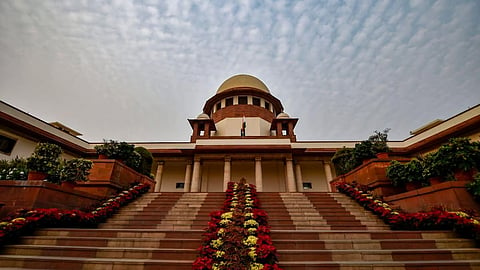

NEW DELHI: The Supreme Court on Wednesday said it would hear, on February 4, a batch of pleas challenging the validity of the law concerning the appointment of the Chief Election Commissioner (CEC) and Election Commissioners (ECs).
The law in question removed the Chief Justice of India (CJI) from the selection panel for Election Commissioners.
During the hearing, advocate Prashant Bhushan, representing an NGO, informed the top court that the incumbent CEC, Rajiv Kumar, is set to superannuate on February 18. Bhushan argued that a new CEC would be appointed under the new law unless the court intervenes.
Bhushan alleged before the court that despite its March 2, 2023 verdict establishing a panel comprising the Prime Minister, the Leader of the Opposition (LOP), and the CJI for appointing the CEC, the Central government later amended this through new legislation.
The new law, The Chief Election Commissioner and Other Election Commissioners (Appointment, Conditions of Service, and Term of Office) Act, 2023, passed in December 2023, excludes the CJI from the selection committee.
Under the new law, the appointments are to be made based on the recommendations of a panel comprising the Prime Minister, a Cabinet Minister, and the LOP.
A three-judge bench of the Supreme Court, led by Justice Surya Kant and comprising Justices Dipankar Datta and Ujjal Bhuyan, noted that the case involves a conflict between judicial opinion and legislative power. "We will hear it on February 4," the bench said.
Bhushan further argued that by removing the CJI from the selection panel, the Executive has gained control over the appointment of Election Commissioners, posing a "threat to electoral democracy."
The court acknowledged the gravity of the issue but emphasised that such significant matters require adequate time for hearing. The bench instructed lawyers to remind the court about the case on February 3, so it could be taken up on the following day.
Several individuals, including Congress leader Jaya Thakur, and NGOs such as the Association for Democratic Reforms (ADR), the People's Union for Civil Liberties (PUCL), and Lok Prahari, have approached the court, challenging the validity of the 2023 Act. They have sought a stay on the operation of Section 7 of the Act, which excludes the CJI from the selection panel for the CEC and ECs.
The petitioners argued that the previous system, which included the CJI as a member of the selection panel, safeguarded the autonomy of the institution.
"The 2023 Act was enacted in response to a Supreme Court ruling that called for insulating the process of appointing Election Commissioners from executive influence, recommending the inclusion of the CJI in the selection panel. The new legislation, however, diverges from this suggestion, raising concerns about potential political interference in the selection process," the petitions stated.